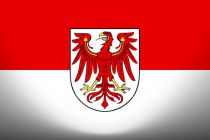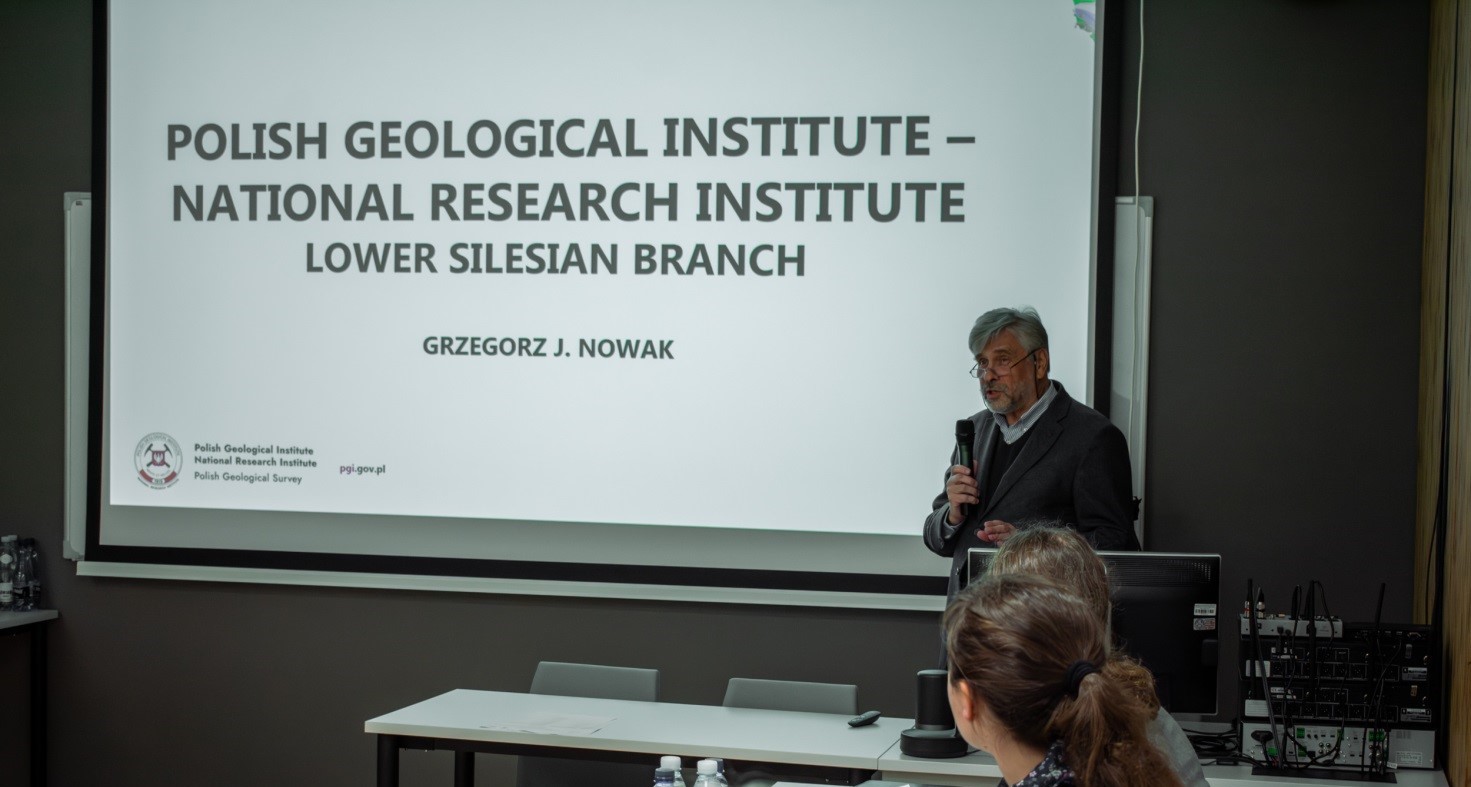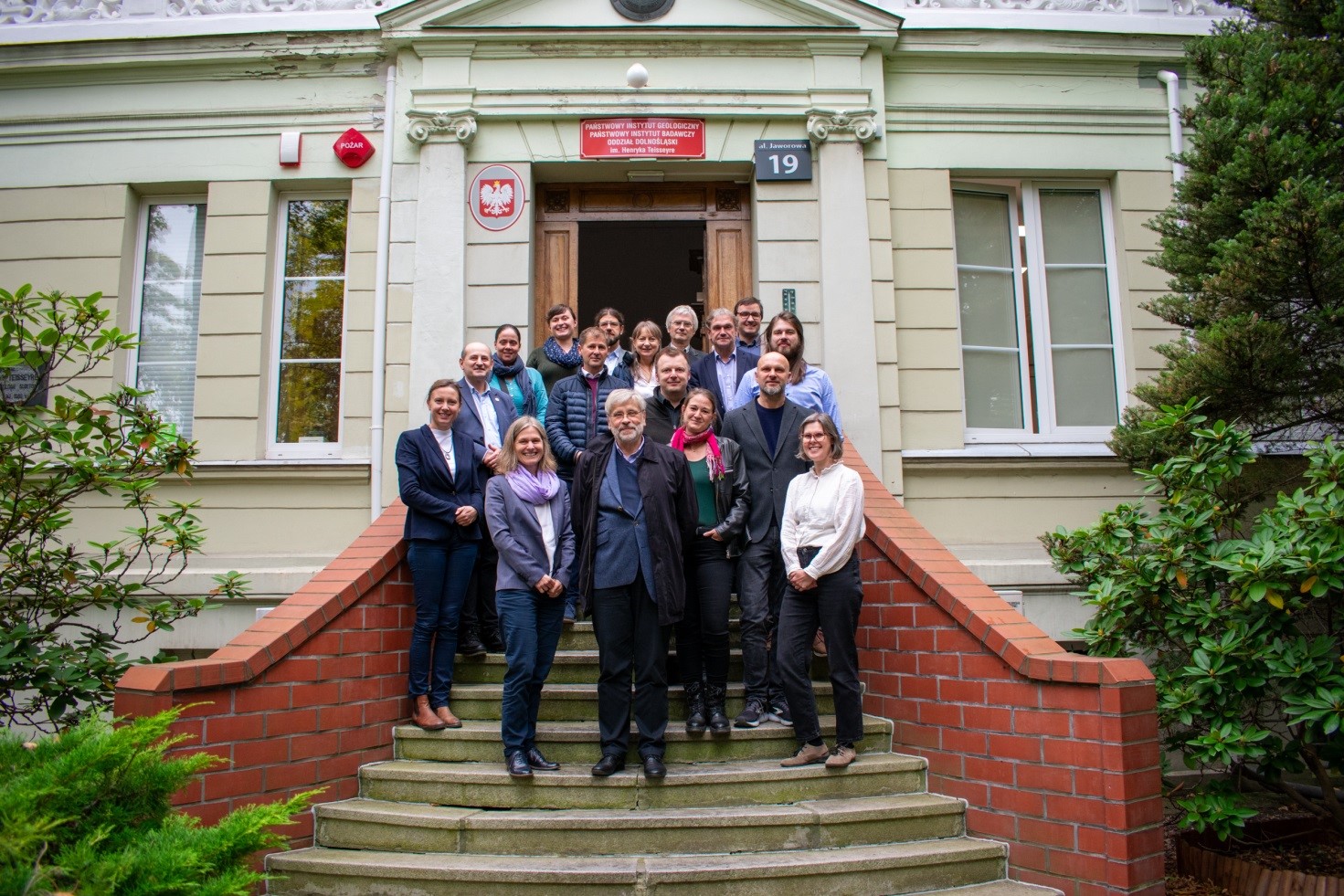 On 30 September 2025, the Lower Silesian Branch of PGI-NRI organised a Polish-German meeting of geological services in Wrocław, namely the Brandenburg Geological Service (LBGR – Landesamt für Bergbau, Geologie und Rohstoffe Brandenburg) and the Polish Geological Service (represented by the Lower Silesian Branch of PGI-NRI in Wrocław).
On 30 September 2025, the Lower Silesian Branch of PGI-NRI organised a Polish-German meeting of geological services in Wrocław, namely the Brandenburg Geological Service (LBGR – Landesamt für Bergbau, Geologie und Rohstoffe Brandenburg) and the Polish Geological Service (represented by the Lower Silesian Branch of PGI-NRI in Wrocław).
The working meeting presented opportunities and areas of mutual research interest, discussed potential further cooperation and prepared a joint project under the Interreg programme.
The main objectives of the meeting were:
- exchange of experiences between the geological services of Poland and Brandenburg;
- identification of opportunities for cooperation between PGI-NRI and LBGR;
- discussion on the planned joint cross-border project under the 7th call for proposals for co-financing under the Interreg VI A Brandenburg - Poland (BB-PL) 2021-2027 programme.
The meeting was opened by the Director of the Lower Silesian Branch of the PGI-NRI, Prof. dr hab. Grzegorz Nowak, who welcomed all participants and briefly presented the history of the Lower Silesian Branch, described its organisational structure, as well as introduced the representatives of the Branch.

Presentation of the history of the Lower Silesian Branch by its Director, Prof. dr hab. Grzegorz Nowak
Dr Birgit Futterer (Head of Department, Chief Geologist of the Geological Service at the Brandenburg State Office for Mining, Geology and Raw Materials) presented the scope of activities and organisational structure of the LBGR. She also introduced the department heads and participants representing the LBGR.
Both services prepared short presentations introducing the diverse topics of their activities. The Polish side gave the following presentations:
- Groundwater monitoring in the Sudetes as an example of the Czech-Polish cooperation (dr Agata Korwin-Piotrowska);
- The influence of the Turów lignite open-pit mine on hydrogeological conditions in the Polish-Czech-German transboundary area (Rafał Serafin);
- Detailed geological mapping in the Lower Silesia region by PGI-NRI (dr Aleksander Kowalski);
- Geothermal conditions assessment of SW Poland: borehole Optical Fibre Distributed Temperature Sensing vs. manual temperature logging (dr Maciej Kłonowski);
- Shallow geothermal energy maps performed in PGI-NRI (Urszula Wyrwalska);
- Summary of the training for applicants under the terms of the 7th Call of the Interreg VIA BB-PL 2021-2027, which took place on September 17, 2025, in Słubice (Jolanta Duczmańska-Kłonowska).
During the meeting, further actions related to the implementation of a joint project on groundwater pollution in the border region were discussed. The issues of geothermal energy and the possibilities of creating joint cross-border geothermal maps were also addressed. The question of developing geological maps of the border region was raised, and the possibility of obtaining funds for the development of maps and 3D models was also considered.
The Brandenburg Geological Service's project entitled ‘Transformation of abandoned boreholes for use in geothermal energy production’ attracted considerable interest. A significant gap between archival data and new measurements was noted. Some of the boreholes are inaccessible due to existing legal conditions.
The Polish-German meeting of geological services proved to be very fruitful. Both sides decided to jointly develop a project proposal under the Interreg Brandenburg-Poland programme and emphasised the need for regular weekly meetings to prepare it. The German side also invited the Lower Silesian Branch to visit Cottbus in six months' time to further discuss opportunities for cooperation and exchange experiences.

Participants in the meeting: representatives of the Brandenburg Geological Service and the Lower Silesian Branch of PGI-NRI
Text: Agata Korwin-Piotrowska, Katarzyna Szadkowska, Krzysztof Horbowy
Photos: Magdalena Furca














 PGI-NRI offer
PGI-NRI offer Mineral resources of Poland
Mineral resources of Poland  Oil and Gas in Poland
Oil and Gas in Poland 



 Subscribe to RSS Feed
Subscribe to RSS Feed